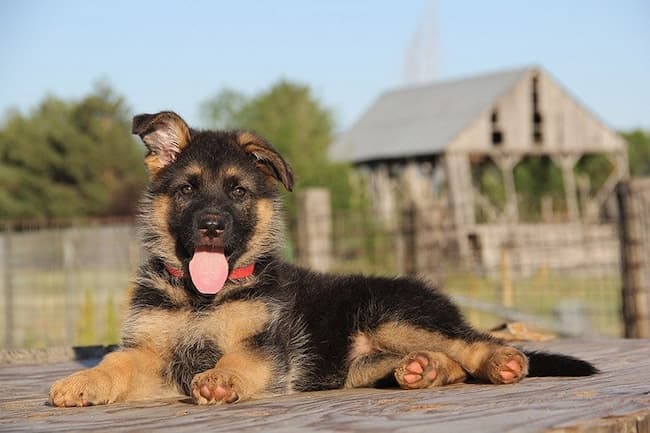German Shepherd Puppy Ears Stages: German Shepherd puppies are known for their pointed and upright ears, which are an identifying trait of this beloved breed. However, it is not uncommon for puppies to experience floppy ears during their first few months. This issue could cause concern to new owners who may wonder if their pup is experiencing any health issues.

In this blog post, we will discuss the different German Shepherd puppy ears stages and offer helpful tips on how to train your puppy’s ears to stand up correctly. Understanding the German Shepherd puppy ears stages is essential for every German Shepherd owner, as it helps create a stronger bond between owner and pup and leads to a healthier and happier dog.
German Shepherd Puppy Ears Stages
German Shepherd puppies are born with their eyes closed and floppy ears. It usually takes about two weeks for their eyes to open. The German Shepherd puppy ears, however, take longer than a week to stand up tall. This can depend on the parent dog as well. For example, Pitbull and German Shepherd mixed dog takes longer than other dogs to have standing ears.
Here, we have given all the German Shepherd puppy ears stages until they are fully standing. Let’s take a look at the stages of German Shepherd ears.
Newborn to 5 months
At birth, a puppy’s nervous system is still developing. This means that a newborn’s brain and body are not yet used to responding to sensory input in a coordinated way. This can make it difficult for the baby to relax, to sleep, and to eat. Fortunately, with time and a little help from you, your puppy will start to develop and grow into a healthy doggy.

German Shepherd ears start standing once they reach the teething stage, which occurs around 4-7 weeks old. The ears will become straighter as the puppy grows, though some puppies may take longer than others. During this time, you’ll want to gently massage the ears to help them stand up properly.
5 to 6 Months
Most German Shepherd puppies whose ears didn’t stand until 3 to 4 months old will have them standing for 5 to 6 months. However, if your puppy is still having difficulty getting to stand, you may need to take him to the vet to get them checked out. Additionally, at this age, your puppy should be gradually introduced to activities that will help him build muscle and strength, such as swimming and walking.

6 to 8 Months
Only a few puppies get their ears standing fully when they are 6 to 8 months. There will be just a few more months until your puppy is a full-grown adult dog. This is when your pup should be getting all of his vaccinations and completing obedience training. German Shepherds are intelligent and love to learn, so now is the time to start teaching them complex commands and tricks.

8 to 12 Months
By this time, all puppies should have their ears standing fully and be fully grown. This is a great time to take your pup to the vet for a checkup, as well as continue training and socialization. Additionally, now is a good time to start teaching your pup more complex commands, such as agility and tracking.

At one year of age, your puppy is officially an adult. Most German Shepherds are considered to be fully grown by this time, although some may take up to two years. During this time, you will want to continue training and socializing your pup to help him become a well-balanced pet.
German Shepherd Puppy Ears Won’t Stand?
German Shepherd puppies are undoubtedly some of the cutest and most adorable creatures to exist on earth. They have various unique characteristics that are endearing, one of which is their iconic ears that stand upright.
However, it is not uncommon for German Shepherd puppies to experience a problem with their ears, wherein they fail to stand up. This can be a frustrating and worrying issue for pet owners, especially considering the importance of the canine’s ears, not just for aesthetic reasons, but also for health.

One of the reasons why German Shepherd puppies experience ear problems can be attributed to genetics. There’s evidence that some puppies inherit floppy ears from their ancestors. A Chihuahua and German Shepherd mix may take lesser time than other dogs to have standing ears.
On the other hand, it can also be because the puppy is still too young and has yet to develop the proper muscles to keep their ears up. But regardless of the cause of this affliction, keeping a watchful eye on your puppy’s ears is vital as it often has implications for their health.
It is essential to correctly identify the cause of the ear problem before deciding on a solution. In some cases, simply massaging the ears frequently can help stimulate muscle growth. In other cases, more specialized treatment might be necessary. For example, taping the ears to ensure they stand upright can help prevent further damage to the ear cartilage. Furthermore, it is instrumental to observe your puppy’s ear health continually.
Training a German Shepherd Puppy Ears
Taking the time to properly understand a German Shepherd puppy ears stages can make a significant difference in your dog’s life. It can help create a strong bond between owner and pup and lead to a healthier and happier dog. Proper ear training is essential for German Shepherds due to their high energy levels, intelligence, and need for exercise and mental stimulation.
One of the benefits of ear training is that it helps prevent ear infections and other ear-related health problems. German Shepherds are prone to ear infections, which can be painful and uncomfortable for the dog. By training their ears to stand up straight, the flow of air into their ears is improved, thus reducing the likelihood of infections.
Proper ear training also helps to improve communication between the owner and the dog. German Shepherds are highly intelligent and learn quickly, so if trained properly, they can pick up on cues and commands. The stronger the bond between the owner and the dog, the easier it becomes to communicate and understand each other.
Here are some key factors to remember when training a German Shepherd’s ears:
- Start ear training as early as possible when the puppy is still young and more receptive to learning.
- Spend consistent time on the training; it can be a few minutes a day, but it should be consistent.
- Use positive reinforcement techniques such as praise treats to motivate your puppy.
- Do not force the ears to stand upright as it can cause pain or injury. Be patient and consistent; the ears will eventually stand up on their own.
- If you encounter any problems, seek guidance from a professional trainer or veterinarian.
Conclusion
To sum it up, the German Shepherd puppy ears stages vary. Don’t worry if your pup’s ears are not standing. The borderline to wait is for 8 months. If they still can’t raise their ears, visit a vet. So, if you’re a future or current owner of a German Shepherd puppy, make sure to take the time to focus on your pup’s ears. That’s all for this post. Visit our German Shepherdss site for more tips and useful guides.

